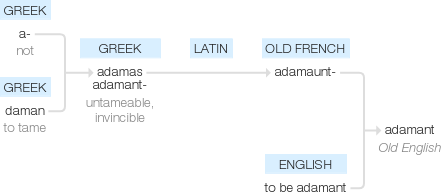Adamant
Old English (as a noun), from Old French adamaunt-, via Latin from Greek adamas, adamant-, ‘untameable, invincible’ (later used to denote the hardest metal or stone, hence diamond), from a- ‘not’ + daman ‘to tame’. The phrase to be adamant dates from the 1930s, although adjectival use had been implied in such collocations as ‘an adamant heart’ since the 16th century.
wiktionary
From Middle English adamant, adamaunt, from Latin adamantem, accusative singular form of adamās(“hard as steel”), from Ancient Greek ἀδάμας(adámas, “invincible”), from ἀ-(a-, “not”) + δαμάζω(damázō, “I tame”) or of Semitic origin.
etymonline
adamant (adj.)
late 14c., "hard, unbreakable," from adamant (n.). Figurative sense of "unshakeable" is by 1670s. Related: Adamantly; adamance.
adamant (n.)
Old English aðamans "a very hard stone;" the modern word is a mid-14c. borrowing of Old French adamant "diamond; magnet" or directly from Latin adamantem (nominative adamas) "adamant, hardest iron, steel," also used figuratively, of character, from Greek adamas (genitive adamantos), name of a hypothetical hardest material, noun use of an adjective meaning "unbreakable, inflexible," which was metaphoric of anything unalterable (such as Hades), a word of uncertain origin.
It is perhaps literally "invincible, indomitable," from a- "not" (see a- (3)) + daman "to conquer, to tame," from PIE root *deme- "to constrain, force, break (horses)" (see tame (adj.)). "But semantically, the etymology is rather strange," according to Beekes, who suggests it might be a foreign word altered in Greek by folk etymology, and compares Akkadian (Semitic) adamu.
Applied in antiquity to a metal resembling gold (Plato), white sapphire (Pliny), magnet (Ovid, perhaps through confusion with Latin adamare "to love passionately"), steel, emery stone, and especially diamond, which is a variant of this word. "The name has thus always been of indefinite and fluctuating sense" [Century Dictionary].
